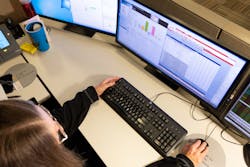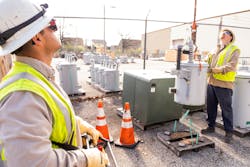A Mobile Platform For Efficient Restoration
According to technology research firm International Data Corp., “By 2025, 50% of utilities will implement a platform approach to operations, integrating core applications, improving visibility, management and efficiency to boost tight operating margins.”
The electric utility industry is innovative in many areas. Utilities build resilience with advanced distribution management systems and fault isolation/service restoration technologies, map circuits with robust geographic information systems (GIS) and manage outage restorations during storms with integrated outage management systems (OMS). However, the industry has been slow to realize the full potential of technologies on mobile devices in the field, holding back the benefits of a platform approach to mobile workforce management.
For an industry that needs to be able to move the right people and resources where they are needed the most urgently, agility and accuracy are important. One way to achieve that is to adopt new tactics and technologies that enable smoother, more efficient deployment of those assets across service territories.
The Paper Problem
Unlike most construction projects, T&D systems are dynamic, so an as-built diagram that has a good shelf life for some sectors becomes rapidly outdated in the electric utility industry. This shorter shelf life presents utilities with a serious paper data problem.
Consider a service area with 1750 circuits and 70 field offices, each location servicing between 20 and 30 circuits. Keeping five copies of each feeder map on hand in this scenario means a utility would need to maintain about 9000 copies. Furthermore, for utilities with multiple operating companies, this number could reach as high as 45,000.
Start Small, Scale Big
Mobile workforce management is the set of processes and technologies deployed across enterprises to support and empower mobile workers as they perform their jobs. Whether it is field reps providing daily service or crews performing line work, mobile workforce management is playing an ever-increasing role. However, going digital and eliminating the mountain of paper feeder maps is not the entire solution to mobile workforce management during storm response.
Organizations must address a wider variety of components in their mobile workforce management strategy, including secure access to GIS data, integration of outage management, and connecting the field and back office for a shared view of damage assessment and repair. To get there, start small and scale big.
Alabama Power then chose to pilot first-generation iPads. The clear argument against such devices was that the utility has legacy Windows applications. However, this became a moot point because field workers were not leveraging the utility’s legacy systems while out in the field. They came back to the office to use those systems.
The utility experienced the following benefits of using iPads:
- Always on (no bootup time), easy to carry, true touch-screen mobile interface.
- Inexpensive yet durable, especially compared to rugged laptops.
- Always connected with built-in LTE, so no dealing with Wi-Fi-only issues or tethering.
- Great for navigation to assets with built-in GPS and leveraging location-based apps.
- Seemingly endless supply of third-party apps to meet the utility’s needs.
- Device-agnostic, web browser-based apps reduce downside of native apps.
- Larger screen size than a phone for viewing maps, for example.
- Can double as a laptop with keyboard, mouse and virtual Windows desktop.
When Alabama Power gave iPads to a group of line workers and the engineering staff they work with, these workers discovered other benefits. In addition to the
aforementioned benefits, these workers found they could do some amazing things:
Document conversion — All of the utility’s construction standards, spec books and safety manuals were converted to PDF documents, reducing the binders of printed documents stored and updated on every truck across the system. They are now always available, up-to-date and searchable.
Paperless processes — Construction drawings, work estimates, material lists and time sheets among other documents were saved to a SharePoint site, so the workers could access them from the iPads. PDF design drawings could be easily marked up and forms easily filled out with PDF editing apps.
Document transmission — Completed work could be saved to SharePoint, uploaded elsewhere or emailed.
Finding Success
Alabama Power quickly found more ways to use iPads by simply making data accessible to them, including GIS mapping information, asset/equipment historical data and operations manuals, customer reliability information, meter demand information, customer outage information, and various reports and dashboards.
These quick-and-easy wins gave field personnel information at their fingertips, enabling them to work more safely and efficiently and provide better customer service. It was a grassroots effort that led to broader adoption. This success created an appetite within the field workforce to pursue even more mobile opportunities.
Despite the success, Alabama Power also had to face challenges: The utility had to manage the development of a mobile workforce management strategy that eliminated app overload for line workers; brought systems and people together; and maintained the security of proprietary information. Importantly, integrating mature GIS capabilities and making a significant investment were critical to the utility’s strategy for meeting these challenges.
A Platform Approach
The electric utility industry must keep striving for a platform approach to technology, especially regarding mobile workforce management. An investment in mobile workforce solutions will help to create a utility operating system that integrates and leverages a power provider’s blue-sky and storm-response digital ecosystem.
Chris McClain is the team leader for power delivery technology at Alabama Power. His more than 22 years of experience includes distribution engineering, planning and mobile technology support for utility field workers. McClain earned his BSEE degree from Mississippi State University and his MBA degree from the University of Alabama at Birmingham.
About the Author
Chris McClain
Chris McClain is the team leader for power delivery technology at Alabama Power. His more than 22 years of experience includes distribution engineering, planning and mobile technology support for utility field workers. McClain earned his BSEE degree from Mississippi State University and his MBA degree from the University of Alabama.


